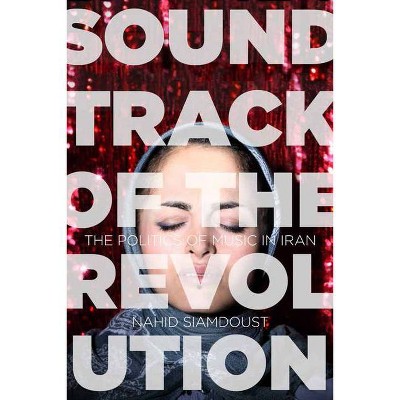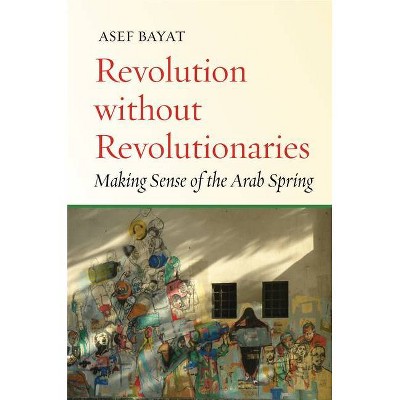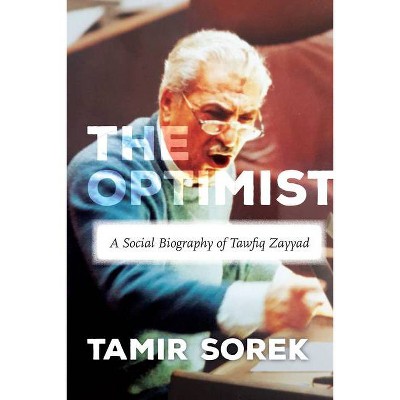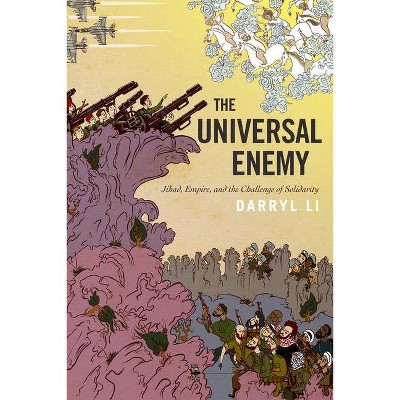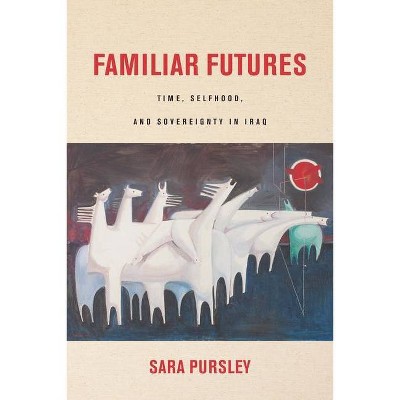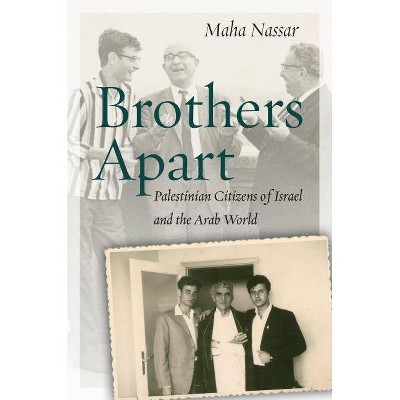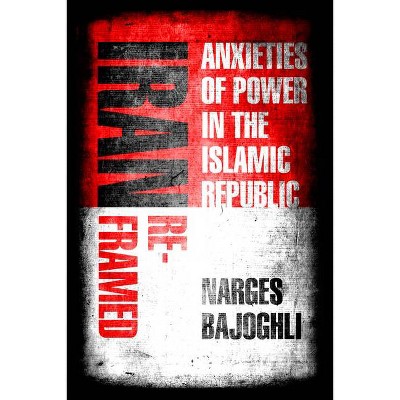Refugees of the Revolution - (Stanford Studies in Middle Eastern and Islamic Societies and) by Diana Allan (Paperback)

Similar Products
Products of same category from the store
AllProduct info
<p/><br></br><p><b> About the Book </b></p></br></br>Set in a Palestinian camp in Lebanon, <i>Refugees of the Revolution</i> is both an ethnography of everyday life and a provocative critique of nationalism, exploring how material realities and evolving solidarity networks are reconstituting identity and political belonging in exile.<p/><br></br><p><b> Book Synopsis </b></p></br></br>Set in a Palestinian camp in Lebanon, <i>Refugees of the Revolution</i> is both an ethnography of everyday life and a provocative critique of nationalism, exploring how material realities and evolving solidarity networks are reconstituting identity and political belonging in exile.<p/><br></br><p><b> Review Quotes </b></p></br></br><br>[This] book provides a compelling testimony of the day-to-day struggles in Shatila . . . Allan's carefully crafted ethnography avoids reducing the camp to the prevailing sense of hopelessness and despair that has been constitutive for the Palestinian experience and instead delivers a thought-provoking, self-critical reflection on the paradoxes and limits of camp research.--Monika Halkort "<i>Journal of Palestine Studies</i>"<br><br>Allan's book is the key for anyone who wants to understand one of the most dramatic strands of sixty-plus years of Palestinian dispossession.--Victoria Brittain "<i>The Political Quarterly</i>"<br><br>Anthropologist Allan's first major publication is a breakthrough study of life in Shatila, the Palestinian refugee camp in Beirut. The book provides powerful insight into notions of nation, exile, homeland, and return through a detailed and provoking study that forces readers to reassess notions about what it means to be a Palestinian refugee.--<i>The Washington Report on Middle East Affairs</i><br><br>By combining ethnographic observations with quotations from informal interactions and formal narrative interviews, [Allan] reveals that daily life in the camp constitutes a struggle that is economic and existential, as well as political.--Helen Taylor "<i>Refuge</i>"<br><br>Diana Allan has finally produced the book on Palestinian refugees in Lebanon that should have been written twenty-plus years ago . . . Brilliantly employing a phenomenological approach, Allan richly portrays the complexities and the frustratingly intricate negotiations among refugees, and between them and Palestinian power sectors as well as Lebanese national institutions, to secure services and meet personal obligations . . . Allan's meticulous research and insightful observations combine with her articulate writing style to produce extraordinary clarity. She brings to life the constant horrors and dilemmas of Palestinian refugee life in Lebanon by providing the contexts and allowing refugees to speak for themselves. . . . <i>Refugees of the Revolution</i> is a groundbreaking book that should be read by all serious scholars of Palestinian studies and solidarity activists who can draw from its pages fresh thinking in how to support Palestinian rights.--Elaine C. Hagopian "<i>Race and Class</i>"<br><br>Diana Allan, a British anthropologist and activist, has written an important, provocative, and compelling account . . . This is an honest and provocative book that demands close reading and clear understanding of what the author describes and writes about. Allan is a very careful and introspective writer, acutely aware of every word she writes. She understands how easily these words can be misconstrued and misinterpreted. A compassionate sympathizer with the Palestinian predicament, she nevertheless places her duty as an ethnographer and anthropologist above her personal commitments as an activist . . . [R]ichly researched, amply annotated, and theoretically grounded . . . This book should be read by anyone interested in the question of Palestine and the Palestinian people, especially by politicians and diplomats who debate and negotiate the future of the Palestinians as refugees, as a people, and as a nation.--Bassam Abed "<i>H-Net</i>"<br><br>Diana Allan's ethnographic study provides insight into the day-to-day struggles of the residents of the Shatila Palestinian refugee camp in southern Beirut. Through her direct experience in the camp and extensive interactions with the refugees, Allan applies a phenomenological lens to create a collection of narratives based on qualitative research. <i>Refugees of the Revolution</i> weaves stories of the pragmatic survival of Shatila's refugees, to highlight the wider implications of marginalization. Allan's work provides a well-grounded insight into the interdisciplinary effects of refugee life without imposing policy.--<i>Middle East Journal</i><br><br>In an ethnography marked by analytical subtlety, empathy, and political courage, Diana Allan raises questions around the way that activists and researchers working in Palestinian refugee camps focus on the national past, neglecting everyday poverty, survival economies, hopes for the future, individual memories. Her careful attention to the words and lives of Shatila people has produced a study that makes us think again.--Rosemary Sayigh "author of <i>The Palestinians: From Peasants to Revolutionaries</i>"<br><br>In this intriguing study, anthropologist Allan provides a fascinating study of Palestinian identity in exile . . . Identity, Allan therefore argues, lies in the local, wherein emotions and cognitions of sociability mark felt experiences of embodied practices. Allan's methodology of 'ethnographies of the particular' underlines this everyday aspect of lived experiences and, in many ways, identifies the book's major contribution to anthropology and Middle Eastern studies . . . Highly recommended.--B. Rahimi "<i>CHOICE</i>"<br><br>Overall, <i>Refugees of the Revolution</i> is a compelling contribution to the fields of Palestine and refugee studies, and an exemplar for political-economic studies of subaltern groups.--Rana B. Khoury "<i>Journal of Refugee Studies</i>"<br><br>The presumed primacy of economic deprivation over nationalist ideology is among the hottest topics not only in contemporary Palestine studies but also in much of the anthropology of social suffering. For that, and for its excellent ethnographic quality, Allan's timely book has been among the most debated novel works in the field since its release.--Leonardo Schiocchet "<i>American Anthropologist</i>"<br><br>This beautifully written ethnography provides a powerful account of the Palestinian refugee experience in Lebanon. Basing her analysis in the complexities of refugee lives, rather than on received frameworks, Diana Allan has produced a work whose ethnographic richness is matched by its theoretical acumen. <i>Refugees of the Revolution</i> should be read by anyone interested in structural poverty or long-term displacement.--Ilana Feldman "George Washington University"<br><br>With intelligence and compassion, Diana Allan has captured the experience of Palestinian refugees in Lebanon today. An outstanding book, and an important reminder that there can be no just settlement of the Palestinian-Israeli conflict that overlooks the rights of refugees.--Eugene Rogan "author of <i>The Arabs: A History</i>"<br><p/><br></br><p><b> About the Author </b></p></br></br><b>Diana Allan</b> is Assistant Professor of Anthropology and Development Studies at McGill University. She is founder and co-director of the Nakba Archive, a testimonial project that has recorded over 500 interviews on film with first generation Palestinian refugees living in Lebanon.
Price History
Price Archive shows prices from various stores, lets you see history and find the cheapest. There is no actual sale on the website. For all support, inquiry and suggestion messages communication@pricearchive.us
